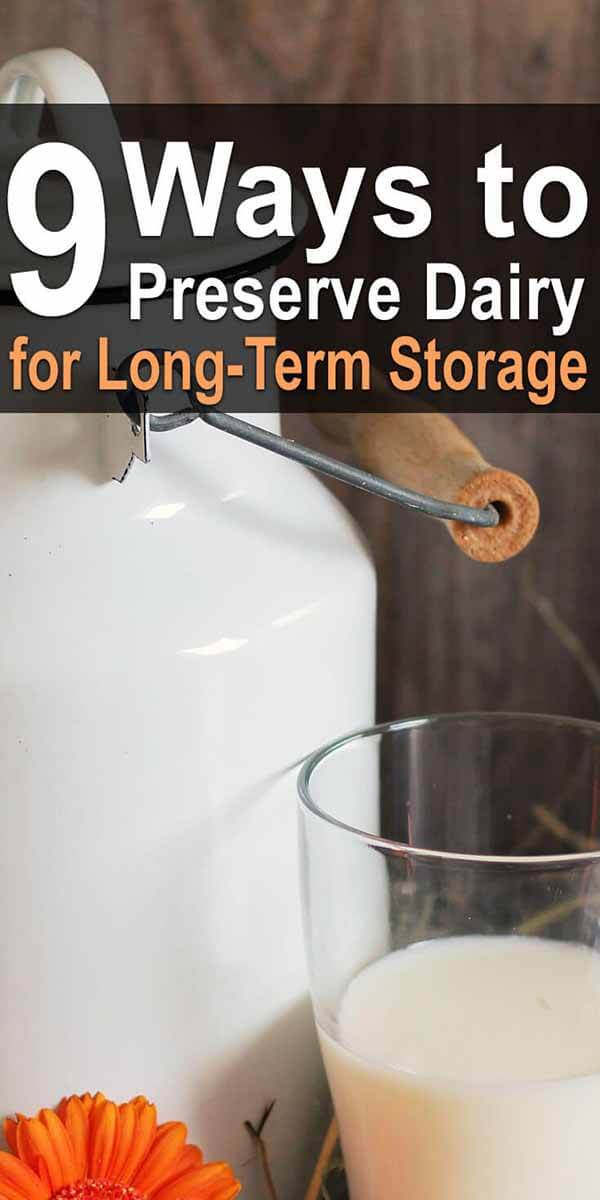Estimated reading time: 5 minutes

Keeping your “perishables” from perishing can be tricky. Most chickens don't produce eggs all year, and homestead cows go through dry periods. How do you make sure you have enough milk, eggs, butter, and cheese to keep your family eating well all year round?
Here are 9 methods…
1. Freezing
Freezing is a dependable way of extending shelf life and keeping dairy and eggs from spoiling, but they won't be quite the same.
When milk is frozen, it tends to separate and it never quite tastes the same in a glass. Previously frozen milk is still perfect for cooking or baking.
Frozen eggs make for rubbery fried egg breakfasts. They won't cook right in the pan but they still perform perfectly well in baked goods.
For cheese, try cooking it into a final product before freezing. While previously frozen cream cheese may be a bit suspect, a frozen cheesecake usually defrosts without issue.
2. Dehydrating
Eggs can be dehydrated in as little as 8 hours in a counter food dehydrator and will store for months. Simply crack them open, whip them up, and spread them on trays in the food dehydrator (using a fruit leather insert since they're liquid). Once dehydrated, you can fit about 2 dozen eggs in a pint mason jar. Keep in mind that they'll still need to be cooked before use.
Cheeses also dehydrate easily and make a tasty powdered topping. Think about dried cheddar cheese popcorn topping or dried Parmesan. Dice the cheese thinly and dehydrate in a food dehydrator until it's very dry. Powder it in a blender and store it at room temperature.
3. Wood Ash Storage
Storing in wood ash dramatically increases the shelf life of both eggs and cheese. Eggs stored in hardwood ash in a cool dark place can last up to a year.
Firm and hard cheeses, such as Gruyere, have been traditionally stored in wood ash to enhance their flavor and improve storage life. After 3 months, the cheese will be slightly smokey, but still as tasty (if not more so) than the day it was stored.
4 & 5. Oil or Wax Storage
The shelf life of some cheeses, such as mozzarella and feta, can be improved by storing them submerged in olive oil. Though the flavor is improved and shelf life is extended, these cheeses still need to be refrigerated. Other firm and hard cheeses, such as cheddar, can be stored outside the refrigerator in a cool place if they're waxed to seal the surface from contamination.
Most supermarket eggs have been washed, which removes their natural protective coating. These eggs are open to bacteria and contamination in the air, which is why washed eggs are refrigerated.
You can store supermarket eggs at room temperature for months if you first seal them with a little neutral oil. Lightly cover your hands in oil, and use your oiled hands to rub each egg to completely coat. Replace them in the egg carton, and store in a cool dry place for months.
Studies in the developing world have shown that eggs can be kept fresh without refrigeration by using oil coating, even in at the peak of summer. In one study, oil-coated eggs lasted 5 weeks at nearly 80 degrees.
6. Canning
The USDA does not consider canning to be a safe practice for dairy products. While in times past, plenty of people pressure canned milk without issue, it's now considered too risky for home canners.
Instructions you can still find for canning milk say to pressure can it at 10 pounds of pressure. Bring the canner up to temperature, and then turn off the heat and allow the pressure canner to cool naturally for a while. You'll know it's done cooling off if you open the exhaust valve and no steam escapes.
Eggs, even pickled, are not approved for canning either. The vinegar in the pickling solution does not sufficiently penetrate the egg to safely preserve them at room temperature. While you may see old time movies with a barrel of pickled eggs on the bar room counter, those eggs had the potential to carry botulism. Maybe 99 out of 100 times those eggs were safe, but I personally wouldn't risk it.
7. Rendering
For butter, rendering it into ghee is an ancient practice that keeps butter shelf stable for months even in hot, humid environments like India. Ghee is made by slowly heating the butter to drive off excess water, and then skimming off butter solids to leave pure refined oil. Without water or butter solids, there's nothing to spoil in the oil and it will keep much the same way vegetable oils will at room temperature.
8 & 9. Fermenting and Culturing
Fermenting is more or less taking butter or milk and turning it into a cultured dairy product.
Homemade butter from raw cram naturally has cultures in it that will cause it to turn into “cultured butter” if stored on the counter. That culturing process is what gives butter extra flavor. Store-bought butter often has “natural flavor” added to mimic this.
Bog butter is an ancient Nordic practice that involves storing butter buried in peat moss for extended periods, sometimes many years, for enhanced flavor and preservation. Modern researchers at the Nordic Food Lab repeated the process, and successfully stored butter for years.
Cheese making is a traditional way of extending the shelf life of milk by culturing, but soft cultured cheeses store only slightly longer than the raw milk. To truly store milk in cheese form, you'll need to make harder cheeses such as cheddar, Swiss, or Parmesan.
In the short term, raw milk stored on the countertop turns to clabbered milk and can enhance the flavor of recipes if used relatively soon. The same is not true for store bought pasteurized milk because the naturally occurring cultures have been killed by the pasteurization process.












How can you “turn off the heat and allow the pressure canner to cool naturally until it’s reached 10 pounds of pressure again”?
You bring the canner up to 10 pounds pressure (15 if your altitude is over 1000 ft), then you let the canner cool until it returns to normal (ie, zero).
Canning instructions are critically important. While we can all make mistakes, it is of the utmost importance that you confirm the accuracy of what you have written.
You’re right, I think that was a typo. I updated the article.